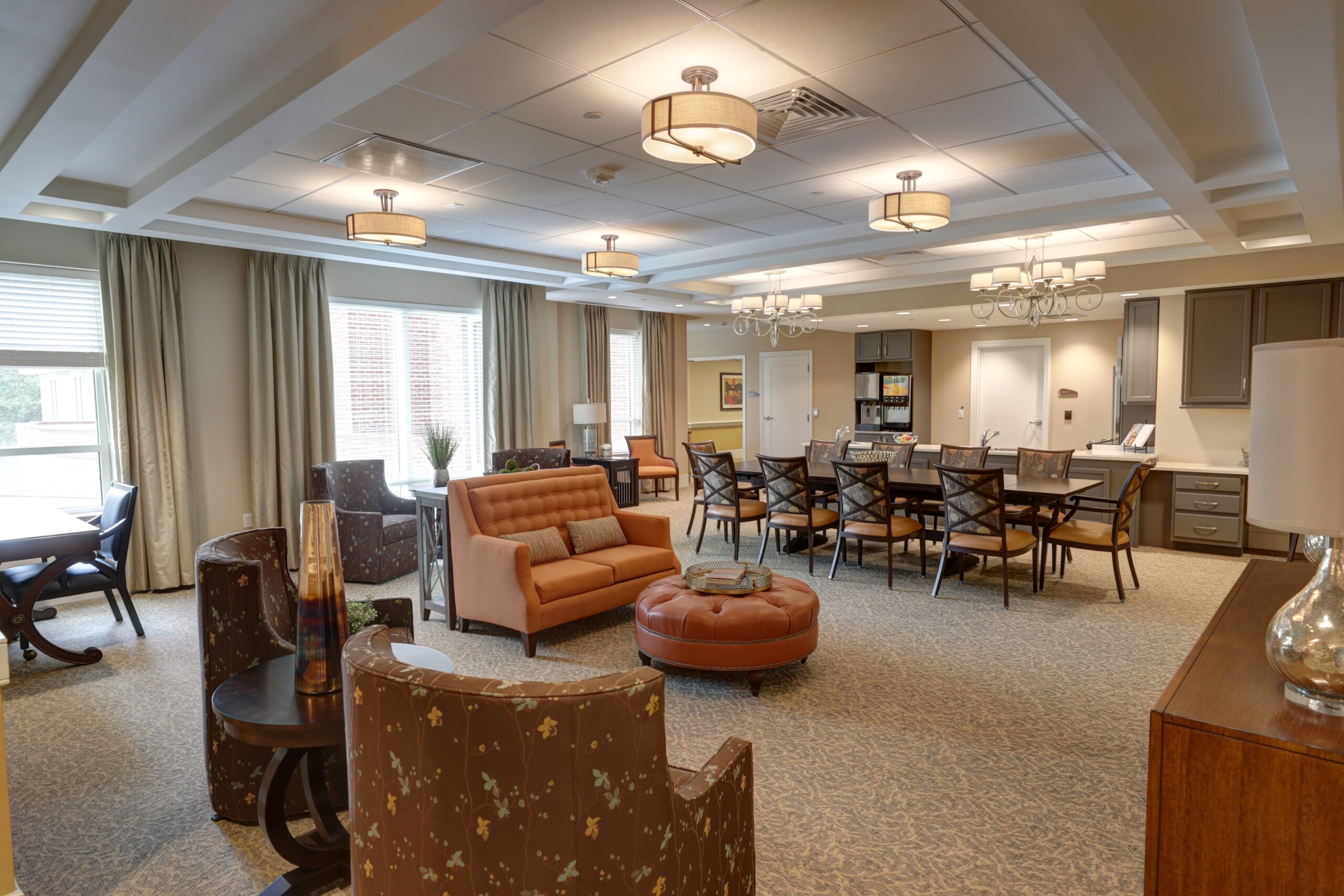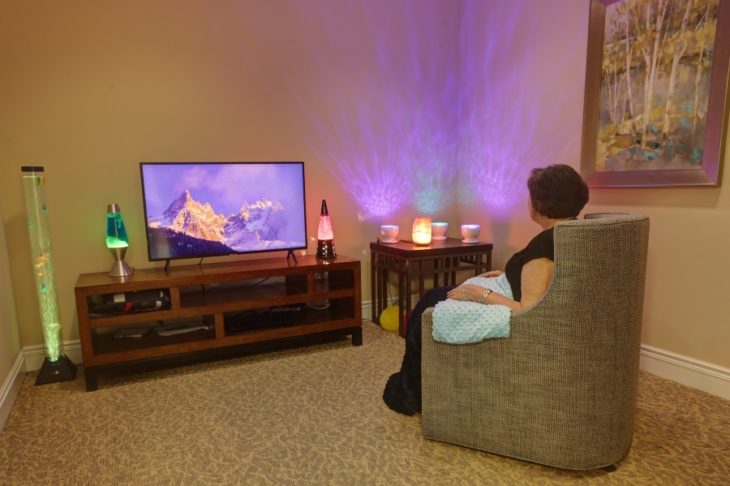Memory care communities offer tailored environments and compassionate support for people navigating the challenges of dementia and Alzheimer’s.
At Branchlands, we built a dedicated memory care residence for our Charlottesville community because we know first-hand how transformative high-quality, specialized care for dementia can be.
Understanding Dementia and Alzheimer’s
The term dementia covers a range of cognitive disorders, and Alzheimer’s is the most common type. Characterized by memory loss, impaired communication, and declining problem-solving abilities, dementia also presents behavioral and emotional symptoms such as irritability, anxiety, and depression.
For family members, caring for a loved one with dementia is emotionally and physically taxing. Private homes are not designed for the security of people with cognitive challenges, and family members are not trained specialists. Families often find themselves watching their loved one struggle with daily activities, communication, and personal relationships, without knowing how to help. The growing need for more support comes into conflict with the caregivers’ other responsibilities and needs, including their own health.
Fortunately, these tensions can be resolved. By providing a structured environment and personalized support, with the right balance of stimulation and comfort, memory care communities raise quality of life for both residents and their families.
The Role of Memory Care
Memory care offers a comprehensive approach to the specific challenges of dementia, going well beyond what is available at ordinary nursing homes or assisted living.
Individualized Care Plans
At Branchlands, we respect the differences which make every individual unique. While security, stimulation, and routine are mainstays of good memory care, each of our residents receives a personalized care plan tailored to their needs and preferences.
To build the personalized plan, we use comprehensive assessments, and we collect information about residents’ life histories and habits. When someone has a different sleep schedule or a specific dietary preference, for example, those are honored and incorporated into their care.
Nutrition, wellness activities, and social interactions all play a part in the integrated, individualized plan for ensuring comfort and well-being.
Specialized Staff
The foundation of memory care is 24-hour supervision and support from specialized staff. Branchlands caregivers understand the nuances of dementia care, and they undergo extensive training. At all times of day or night, they are prepared to respond effectively to dementia’s unique challenges and to foster a positive environment.
We provide residents with comprehensive, highly personalized support which includes specialized physical therapy, occupational therapy, and speech-language therapy. Each resident benefits from adaptations and strategies to generate better communication, fewer frustrations, and improved daily experience.
Our community also attends to the needs of family members. We host sessions on Alzheimer’s from a variety of home health groups, conduct monthly meetings with families, and offer therapy services throughout the year.
Safe and Comfortable Environments
Safety sits at the center of residence design. Secure living spaces prevent residents from wandering or getting lost. In our memory care wing at Linden House, features like locked doors, enclosed outdoor spaces, and easily navigable interiors contribute to an environment that minimizes risks.
Through intentional design, we’re able to achieve this security without the slightest hint of an institutional feel. Everything from room layout to furnishings and color schemes helps create a warm, inviting setting where residents feel at peace and at home.
Our memory care neighborhoods are one of the most unique features of our community. By situating individual residences in small clusters, each with their own common area, we create a cozy neighborhood feel where each person has access to both privacy and communal interaction. This arrangement promotes relationships among residents and between residents and staff.
Emphasis on Routine and Structure
Individuals with dementia find great comfort in routine. Confusion is a common problem, and the unexpected and unfamiliar can often lead to frustration or anger.
Memory care communities create structured daily schedules to provide predictability and familiarity. Consistent routines create a stable environment, reducing anxiety and confusion so that residents can thrive.
At Branchlands, a typical day for a memory care resident might look like this:
- Wake-up, as desired (we honor individual sleep patterns)
- Aromatherapy to energize the body and enhance alertness
- Morning assistance with Activities of Daily Living (ADLs)
- A nourishing breakfast cooked from scratch
- Group activities, such as exercises, creative arts, and music
- Morning beverage
- Games and social activities to promote cognitive retention
- Transition to lunch and lunch support
- Aromatherapy for rest and relaxation
- Structured nap time to refresh mind and body
- Music and memory games for joy and fun, such as travelogues, sing-alongs, trivia, and exercise
- An attractively presented and nutritious dinner
- Reminiscence, comfort, and bedtime preparations
- Nighttime checks and support, extra warmth, and toileting support throughout the night
Cognitive Stimulation Programs
The best routines actively engage residents through programs designed to improve cognitive performance and slow the progression of cognitive decline. Cognitive stimulation programs encompass a variety of activities, including sensory stimulation, memory exercises, art therapy, and music therapy. At a dedicated memory care community, these activities are woven into the fabric of daily life.
Every week our residents play memory games, engage in music therapy and sensory therapy, and attend social gatherings and activities. Those with religious or spiritual routines take part in spiritual devotions, and everyone has the chance to enjoy special events, like a piano recital or cookie making with visiting Girl Scouts.
Since a connection with nature also helps improve both cognition and mood, we love providing our residents with supervised strolls among the aromatic herbs and soothing plants in our memory garden. Our memory care residents also take trips around Charlottesville, such as fall walks at the nearby Monticello Trail.
These kinds of stimulation contribute to more than cognitive function—they lift overall quality of life.
Life to the Fullest
Here at Branchlands Senior Living in Charlottesville, we incorporate cognitive testing into our regular assessments for residents, including those in Assisted Living. Our therapists want to pick up any cognitive challenges in the earliest stages when preventive therapy and thoughtful adaptations can have their biggest impact.
For those with significant cognitive challenges, our memory care residence offers compassionate, specialized care. We see the powerful impact of this high-quality care each and every day.
Family members enjoy the peace and security that come from knowing their loved one is in the best hands, and residents feel comfort, support, and a sense of home.
If you are looking for memory care in Charlottesville, Virginia, contact us.



